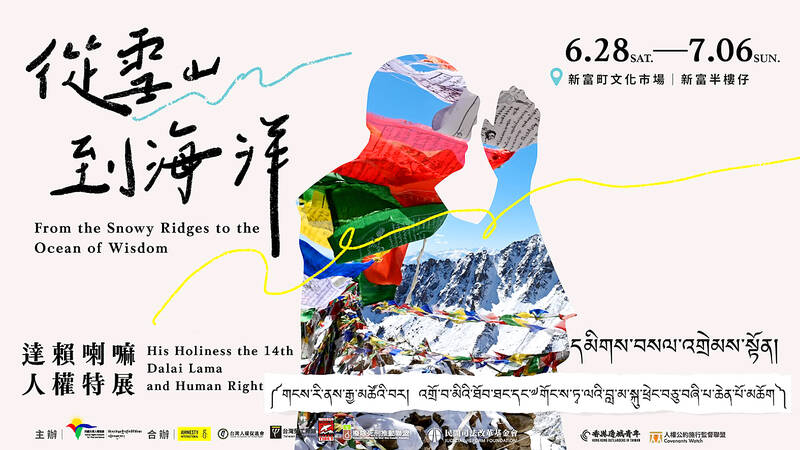A week-long exhibition on modern Tibetan history and the Dalai Lama’s global advocacy opened yesterday in Taipei, featuring quotes and artworks highlighting human rights and China’s ongoing repression of Tibetans, Hong Kongers and Uighurs.
The exhibition, the first organized by the Human Rights Network for Tibet and Taiwan (HRNTT), is titled “From the Snowy Ridges to the Ocean of Wisdom.”
“It would be impossible for Tibetans inside Tibet to hold an exhibition like this — we can do it. because we live in a free and democratic country,” HRNTT secretary-general Tashi Tsering said.

Photo: Screen grab from Human Rights Network for Tibet and Taiwan’s Facebook page
Tashi Tsering, a Taiwan-based Tibetan who has never visited his homeland, recalled meeting the Dalai Lama — widely regarded as the spiritual leader of Tibetans and the most prominent figure in Tibetan Buddhism — before founding the organization in 2016.
Tashi Tsering said that the 1989 Nobel Peace Prize laureate told them: “You should not only focus on human rights in Tibet, but also care about human rights in China, and those of the Uighurs, Hong Kong and Taiwan.”
With that spirit in mind, HRNTT partnered with civic groups in Taiwan to organize the exhibition, aiming to raise awareness of Tibet’s struggle under Chinese rule and highlight the Dalai Lama’s broader human rights concerns, Tashi Tsering said.
The exhibition features quotes from the Dalai Lama supporting causes such as LGBTQ+ rights, the abolition of the death penalty, and solidarity with Hongkongers and Uighurs. It also includes artworks by artists from Taiwan, Tibet and Hong Kong inspired by those themes, HRNTT said.
Sharon Lai (賴宣任), one of the exhibition’s first visitors, said Taiwanese should care about issues related to Tibet, as Taiwan and Tibet “share a common, powerful adversary.”
“Taiwanese and Tibetans have different cultures from Chinese,” she said, adding that both of them strongly value freedom and democracy.
The mother of two said she felt “deeply inspired” by how the Tibetan government and its supporters continue to work tirelessly to keep their cause alive, despite living in exile.
The exhibition, which also includes talks on human rights in Tibet and beyond, runs through Sunday next week — the Dalai Lama’s 90th birthday.

The manufacture of the remaining 28 M1A2T Abrams tanks Taiwan purchased from the US has recently been completed, and they are expected to be delivered within the next one to two months, a source said yesterday. The Ministry of National Defense is arranging cargo ships to transport the tanks to Taiwan as soon as possible, said the source, who is familiar with the matter. The estimated arrival time ranges from late this month to early next month, the source said. The 28 Abrams tanks make up the third and final batch of a total of 108 tanks, valued at about NT$40.5 billion

Two Taiwanese prosecutors were questioned by Chinese security personnel at their hotel during a trip to China’s Henan Province this month, the Mainland Affairs Council (MAC) said yesterday. The officers had personal information on the prosecutors, including “when they were assigned to their posts, their work locations and job titles,” MAC Deputy Minister and spokesman Liang Wen-chieh (梁文傑) said. On top of asking about their agencies and positions, the officers also questioned the prosecutors about the Cross-Strait Joint Crime-Fighting and Judicial Mutual Assistance Agreement, a pact that serves as the framework for Taiwan-China cooperation on combating crime and providing judicial assistance, Liang

A group from the Taiwanese Designers in Australia association yesterday represented Taiwan at the Midsumma Pride March in Melbourne. The march, held in the St. Kilda suburb, is the city’s largest LGBTQIA+ parade and the flagship event of the annual Midsumma Festival. It attracted more than 45,000 spectators who supported the 400 groups and 10,000 marchers that participated this year, the association said. Taiwanese Designers said they organized a team to march for Taiwan this year, joining politicians, government agencies, professionals and community organizations in showing support for LGBTQIA+ people and diverse communities. As the first country in Asia to legalize same-sex

MOTIVES QUESTIONED The PLA considers Xi’s policies toward Taiwan to be driven by personal considerations rather than military assessment, the Epoch Times reports Chinese President Xi Jinping’s (習近平) latest purge of the Chinese People’s Liberation Army (PLA) leadership might have been prompted by the military’s opposition to plans of invading Taiwan, the Epoch Times said. The Chinese military opposes waging war against Taiwan by a large consensus, putting it at odds with Xi’s vision, the Falun Gong-affiliated daily said in a report on Thursday, citing anonymous sources with insight into the PLA’s inner workings. The opposition is not the opinion of a few generals, but a widely shared view among the PLA cadre, the Epoch Times cited them as saying. “Chinese forces know full well that